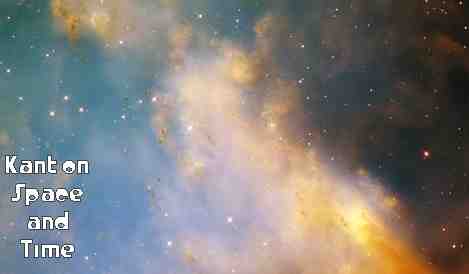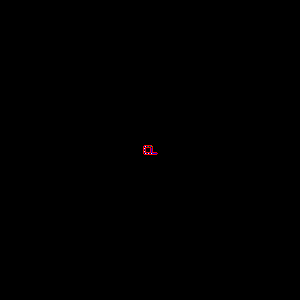
|
|
 |
Agenda |
Last time: the subject brings key elements of structure to experience.
I spoke of categories contributed by the understanding.
Today I want to present some arguments that will be a good deal more accessible than some you will find in Kant.
I will present them first without saying what they might be used to prove. They are about time and space, or about the concepts of time and space. They at least seem to show that there is something peculiar about these things.
Overheads |
First an argument about time.
Time must have had a beginning.
Otherwise an infinite sequence of events must have already elapsed.
But the idea of an infinite sequence of events having already elapsed is an absurd one.
Time cannot have had a beginning.
If it had a beginning, then there must be a reason why it began when it did, and this is to say that a particular moment of time has a causal property, the capacity to bring events into being. Kant thinks this is obviously absurd.
You may think these arguments are not decisive. But let us suppose for a moment that they are. What would follow?
It would follow that time must have had a beginning, and cannot have had a beginning.
If we had to draw such a conclusion, we would have to conclude that something was up. Something was going wrong somewhere.
We should go back to the arguments that purport to show the two contradictory conclusions.
Suppose we did this and found we couldn't fault them.
Where would we go then? Would we have to say that somehow reality was contradictory?
One way of putting Kant's conclusion is to say that we can't accept this. The alternative is that time cannot be real.
'Kant treats his solution as a confirmation of the thesis of transcendental idealism. If space and time, and the world in space and time, existed as things in themselves, the disjunctions in each case would hold as necessary truths. Since the assumption that they do hold leads to contradiction, we have as good a proof as could be desired that space and time and the natural world do not exist as things in themselves, but only as appearances, are only in us etc.' Strawson, Bounds of Sense, p.35.
Kant works the same procedure with space.
The world must have limits in space.
'Kant maintains that the very thought of the infinite spatial extent of the world involves the thought of its being possible to complete a temporally infinite process of surveying successive finite parts of the world.' Strawson, Bounds of Sense, p.177
Strawson colours the idea like this:
Try and think of travellers arriving at the earth from different directions each having having traversed an infinite distance. This conception is impossible, says Kant.
Again, it appears to try and envisage an infinite series which is completed, which Kant appears to believe is absurd.
Space is infinitely extended
Strawson points out that there is a more promising argument in a footnote:
'In general, if x is in y, then x has a definite spatial relation to y, and it makes sense to ask, for example, where exactly in y is x. But where x is the world and y is space, this question makes no sense.' p.182.
But the hypothesis that the world is finite in spatial extent would require us to say that the world is in space, thereby licensing the illegitimate question above.
Report: Universe began by colliding with another |
|
April 13, 2001 The physical universe began not with a primordial Big Bang but with a monumental collision with another universe, a bold new theory suggests. And unlike the older Big Bang cosmological model, the Big Collision surmises that time and space existed long before our universe exploded into physical reality. According to the scientists, the universe began as a three-dimensional void in a higher-dimensional space. Attracted to another such universe, the two lined up and bumped into each other along their surfaces. "The universe was quiet, vacuous. Very slowly, a weak attraction brought them together, creating a collision that made particles and energy," said Paul Steinhardt, one of the researchers. |
That the world had no beginning in time
Suppose that all the while the world has been in existence, a clock has been ticking at regular intervals. If the world has had no beginning, but has existed for an infinite time, then it follows that an infinite number of ticks must have occurred, counting from the present time.
But this is impossible. An infinite number of ticks cannot have been completed, or else the number wouldn't be infinite.
'The infinity of a series… consists in the fact that it can never be completed through successive synthesis.' (Kant, CPR, A427/B455.)
Buzz. Is the argument valid?
Strawson says that the argument is plainly invalid. A series can be infinite at one end, so to speak, and thus be infinite, without being infinite at the other end.
He says Kant must have been thinking of the ticks being counted. It would indeed be impossible to complete a count an infinite number of ticks,even an infinite number that was only infinite at one end. But that is because we can only think of counting as having a start somewhere. We couldn't complete a count of an infinite number of ticks, but that doesn't mean the number of ticks completed at any one cannot be infinite.
That the world had a beginning in time
'If the world had a beginning, then it began at some definite time, say n years ago, and before that time nothing existed at all. But when nothing existed at all, there would be nothing to distinguish one part of time from another and hence nothing to account for the world's beginning to exist at one time rather than another. Hence the world cannot have had a beginning.' Strawson, The Bounds of Sense, p.177.
 Space
and Time as forms of intuition
Space
and Time as forms of intuition So Kant thinks that space and time cannot be features of reality as it is independently of human experience. If you think they apply to a world thus conceived, you run into irresolvable paradox.
So he thinks the temporal and the spatial are contributed by the subject.
But most of the elements contributed by the subject are contributed through the understanding. Space and Time, on the other hand, are said to be forms of intuition.
Remember that two faculties are in play when you experience something. Input from senses are 'intuitions' and the faculty responsible is the sensibility; categorizations of inputs are provided by the understanding through 'concepts' or 'categories'.
Space and Time are said to be 'forms' of intuition.
Why does Kant just treat them as categories?
One reason is this.
The categories are generalisers. Subsuming an intuition under a concept is to put it into a general category.
But Space and Time have nothing to do with putting things into groups, or classifying a thing as a thing of a particular kind. They are singular. Our conception of the external world is emphatically the conception of a world with a single space, and a single time.
It is a world with a single space inasmuch as everything in the objective world is related each to each other spatially.
It is a world with a single time inasmuch as all events are related to each other in a single time-frame. Of any two events in the objective world the second happened before the first, or after the first, or at the same time as the first.
There aren't two time frames, or two spaces.
Header pic thanks to NASA and STScI
Universe began by colliding with another: Report and pic thanks to CNN
Self-reproduction of the SR loop in infinite space: animation thanks to New England Complex Systems Institute
Philosophy in the 17th and 18th Centuries Home
Prepared by VP